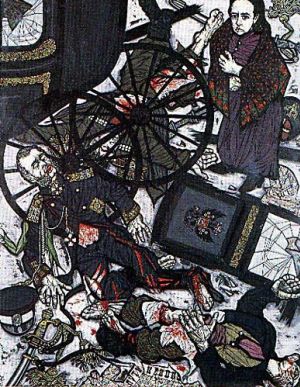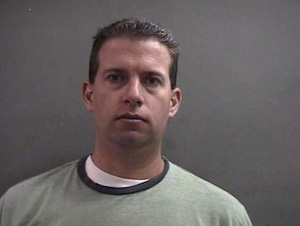Texas psychoprisons
Trigger warning. The news report I discuss includes verbal descriptions of sexual exploitation and extreme violence by caretakers
against male and female patients under their control. It may be triggering for past experiences of violence.
In the past, when I’ve written about violence committed by government police officers or prison guards, I’ve often written something like this:
Please note that if you or I or anyone else without a badge and a gun acted like this, the people around us would more or less universally conclude that we’re belligerent and dangerous lunatics. In fact, if you or I or anyone else without a badge and a gun acted like this, and it was caught on camera, we would soon be in jail for on a charge of assault and battery. When someone with a badge and a gun acts like this, and it’s caught on camera, with a very few exceptions, the worst that ever happens is that they might get fired. The most common response from the powers that be is either to do nothing at all, or else to give the pig a paid vacation and a verbal reprimand.
That’s a point that I stand by, and that I think is vitally important. But one thing you’ve got to remember when thinking about that point is that the class of government-privileged cops and prison guards is larger than the obvious cases you might first think of when asked. Badges and guns
come in a lot of shapes and sizes and prisons can be found in a lot of places. Sometimes the badge is a gold shield and the prison is a penitentiary surrounded by razor-wire and high fences. Sometimes the badge
is a white coat, the gun
is a syringe, and the prison is the locked mental ward
of a hospital. What matters is not the external form, but the underlying relationship of power, and when so-called caretakers
have the legal power to restrain, confine, hold down, drug, shock, spy on, and otherwise coerce or violate a so-called patient,
to treat
her against her will, to force her to remain in a locked room even if she wants to leave, and to chase her down and force her back into that locked room if she tries to slip out without permission, then those so-called caretakers
function as a jailers, and their hospital
as a prison, no less than the corrections officers
and correctional facilities
of the official State prison system.
This is, by the way, a basic point that needs to be made, and needs to be accepted, whether or not one accepts presuppositions of institutional psychiatry, and whether or not one accepts the common practices of involuntary civil commitment, the imprisonment of criminals deemed legally insane in State-run psychoprisons, drugging patients
through the use of force or deception, etc. etc. etc. If you accept those presuppositions and you support imprisoning and forcibly drugging people who, for example, try to hurt (only) themselves, or who have hallucinations, or who steadfastly cling to beliefs that the majority of people consider irrational, then you should go ahead and defend that. But that is what you need to defend–imprisonment and coercive force–not some sentimentalized helping professions
myth in which caretakers are helping willing patients through a disease just like cancer or diabetes.
If you have cancer and diabetes, and you decide (for whatever reason) that you’d rather suffer or even die from it than undergo the conventional treatments, nobody has the legal power to force those treatments on you against your will. And therein lies one of the fundamental political differences between real doctor-patient relationships and psychiatry as it is practiced today. If you want to try to defend psychiatry as it’s practiced today, that difference–the fact of psychiatric imprisonment–is something you’ll have to admit, and where you’ll have to start.
And for those of us who have spent some time watching how the official State prisons and their prison guards work, and who know that the pervasive violence and domination that runs through the system, even when it is judged excessive
or abusive by the powers that be, should be dismissed as Yet Another Isolated Incident carried out by A Few More Bad Apples, but rather recognized as the natural and inevitable result of the kind of environment fostered by the unaccountable power of government enforcers–well, for those of us, things like the Dallas Morning News‘s recent report on intense, pervasive abuse of patients
in Texas’s state psychoprisons should be an outrage, but (heart-breakingly) not at all a surprise:
Last year, one [Texas] state mental hospital employee tackled an adolescent patient who was sobbing for his mother, dragging him across the floor by his wrists and hair.
The year before, another brought a female patient into a hospital bathroom and sexually abused her.
And dozens more have participated in brutal beatings at the psychiatric hospitals since 2005, employee disciplinary reports show – using chokeholds, headlocks and threats of violence to restrain the patients under their watch.
In all, 72 employees across Texas’ 10 state mental hospitals have been fired in the last three years for allegations of physical abuse, according to a Dallas Morning News analysis of state personnel records. Hundreds more have been terminated for other violations, the records show, from sleeping on the job to over-medicating mentally ill patients.
. . . Among the allegations of abuse and neglect state hospital workers have been fired for since 2005:
A worker at the North Texas State Hospital slammed a clipboard on a patient’s head, dragged her by her feet and kicked her in the legs and buttocks.
An employee at the Big Spring State Hospital failed to notice a patient who knotted her sheet and strung it around her neck. The patient was blue by the time staff found her.
At the Austin State Hospital, a male employee brought a female patient into a private room for her to carry out a sexual act on him.
An employee at the Austin hospital tackled a juvenile patient and pinned the patient’s neck and head to the floor, bloodying his lips and face and breaking his glasses.
Other employees were punished for offensive treatment, from using racial slurs on patients to making verbal threats and sexual advances. Some ignored patients’ cries for help while they watched TV, played video games and wrote text messages. Others stole state property and sold tobacco products to patients.
. . .
Jason Evans called 911 in November during a bipolar meltdown and was admitted to the Terrell State Hospital. Days later, the 34-year-old was dead – and his parents still don’t know why.
State officials told the Kaufman couple that their son, who was severely mentally ill but in good physical condition, had been disruptive that evening, and records obtained by the family indicate hospital workers medicated him before sending him to sleep. Mr. Evans was apparently found hours later in his bed, and was no longer breathing.
Lynn Evans, his mother, said psychiatric hospital workers attributed the death to natural causes, and doctors said her son had lost oxygen to the brain. But she and Mr. Evans’ father, a pharmacist, have been unable to get specific details about their son’s death. They believe Jason was effectively overdosed by hospital workers trying to restrain him.
It was a disease. Jason couldn’t help it,said Mrs. Evans, choking back sobs.In my heart, I will go to my grave knowing that hospital killed him.Mr. McBride said that the agency is prohibited from confirming the identities of anyone in their care – but that any unexpected deaths are investigated by the Department of Family and Protective Services or by local law enforcement.
There were no deaths among Terrell State Hospital patients last fall from anything other than natural causes,he said.
And anyone who has followed the official response to past prison abuse scandals (cf. GT 2008-02-21: Mississippi Corrections, GT 2008-02-05: Rapists in uniform, GT 2007-10-28: Corrections officers, etc.) should be outraged, but not at all surprised, by the fact that state Mental Health
officials have responded to the threatening, neglecting, assaulting, raping, and torturing of imprisoned patients
in the usual way that prison bosses respond. That, when the administrators are forced to admit that abuses have happened, the individual psychoprison guards are usually administratively disciplined,
or at worst fired, rather than arrested or sued like the violent criminals that they are. That, when asked, the official mouthpieces of the mental health
prison system reply by lying, covering up, whitewashing, isolating, or minimizing the extent of the violence against patients, by making excuses for the perpetrators, and by telling a bunch of sob-stories about the hard luck of supposed trained professionals who are expected to actually do their tough job without hurting people.
State officials say there will always be some reports of abuse and neglect in an institutional setting. And they say they take any allegations of mistreatment seriously. But the records show that as in other state-run facilities, abuse and neglect are systemic.
. . .
The state’s juvenile prisons, group homes for the disabled, and state schools for people with mental disabilities all came under fire last year for reports of widespread physical and sexual abuse.
. . .
Officials with the Department of State Health Services, the agency that runs the psychiatric hospitals, say abuse and neglect are
absolutely notpervasive – and verified cases are actually dropping.In the last two years, they confirmed 15
Class Icases – the most serious abuse. On average, investigators substantiate 5 percent of the more than 2,000 allegations they examine annually. And 90 percent of patient deaths since 2005 were attributed to natural causes, agency spokesman Doug McBride said. Five were suicides, and none were the result of abuse.
Keep in mind there are about 7,400 employees, 18,000 patient admissions and probably hundreds of thousands of staff-patient interactions in a year,Mr. McBride said.State officials acknowledge that the psychiatric hospitals are stressful environments; there are times, Mr. McBride said, when employees
do not handle a situation appropriately.But they say the rules for reporting abuse and neglect are stringent – and confirmed cases of physical and sexual abuse are reported to police.And they balk at the suggestion that conditions bear a resemblance to the state schools for people with mental disabilities, where the U.S. Justice Department has intervened twice in recent years.
The state psychiatric hospitals, which have about 2,500 patients daily, had 137 confirmed abuse cases in 2007. The state schools for people with disabilities, which have twice as many residents, have an average of 300 confirmed abuse cases per year.
But some advocates fear the mentally ill patients may face greater risks. Patients of the psychiatric hospitals are largely indigent, transient and not connected to their families, so they have few allies as they bounce through the mental health system.
It’s a population that’s easy to abuse because they’re not on the radar in any way,said Richard Hansen, a Texas mental health advocate who was chemically restrained, shackled and beaten to the point of broken ribs years ago while suffering from bipolar disorder in a New York mental hospital.. . . Mr. Hansen said many employees are conscientious, but conditions vary from hospital to hospital and ward to ward. Some are simply warehouses, where patients are often overmedicated and ignored. In others, patients frequently turn up with unexplained injuries, he said.
Besides the fact that it is just a lie to claim that a problem that has involved hundreds of employees in the last three years alone is somehow absolutely not pervasive,
one of the most important factors simply goes unmentioned here — that it is really, really easy to get away with far more violence and abuse than crops up in verified
official reports, simply because guards tend to stick together against any allegations made by inmates, and because they can act with an incredible amount of impunity when officials will never trust a victim’s testimony, and will happily wave it off, whenever it’s convenient to do so, as the product–literally–of feeble-mindedness or insanity. No wonder that 5% (and dropping) of the 2,000 abuse allegations filed every year end up getting verified
by the officials.
And, to cap it all, no matter how bad and how widespread the abuse may get, the administrators can always count on the pro-establishment wing of their supposed critics to go to the public and to the legislature to beg for even more tax money and even more prison guards to be sent into the psychiatric prison system, so that the very people who created these maddening prison-ward hellholes can be rewarded for their institutionalized violence by being allowed to take even more money from taxpayers to go on doing the same old thing:
The state psychiatric hospitals, like other systems for vulnerable Texans, are chronically starved for cash, advocates of more state funding say, and services at the local level can’t keep up.
. . .
You get what you pay for,said Rep. Garnet Coleman, D-Houston, who has bipolar disorder.When you financially dumb something down, you make services cheap, something’s got to give. Unfortunately, it usually ends up being a mentally ill or disabled Texan.. . .
Aaryce Hayes, a mental health policy specialist with Advocacy Inc., said the Department of State Health Services is working to improve the state hospital system, from incorporating trauma-informed treatment into care regimens to increasing employee empathy training. It is also trying to reduce reliance on restraint and seclusion to keep control of patients.
They get it,she said.They want to see a culture change.But it’s hard to improve when the state hospital system is so overburdened, Ms. Hayes said. Right now, the state funds just 27 percent of mental health needs in the community – meaning everyone else rotates in and out of crisis care. There are more than 450,000 adult Texans with serious and persistent mental illness, everything from schizophrenia to major depression, Ms. Hayes said.
If we said we were serving just 27 percent of people who had cancer, or diabetes, nobody would be comfortable with that,Ms. Hayes said.Money is a persistent problem. In 2003, lawmakers stripped $100 million from the state’s mental health budget, Mr. Coleman said – funding that has only partially been replaced.
The Legislature approved $82 million last year to improve community mental health crisis services, said Robin Peyson, executive director of the National Alliance on Mental Illness’ Texas chapter. But Texas ranks 48th in the country in per capita funding for people with mental illness, so that money only begins to address the shortfall.
There are not services at the community level and there are not enough beds in the system,she said.If you have inadequate funding, you’re just supporting this cycle, this revolving wheel.
The reality is that what is needed is not more money, or more guards, or better training, or even a culture change.
A culture change would be a step forward, but the real solution that is needed is something that goes far deeper: a solution that strikes at the root from which that culture and these conditions grow. What is really needed is a power change, so that psychiatric wards are no longer artificially packed by court order, so that patients can leave and seek help through other means if conditions become unbearable, and so that supposed patients are no longer treated
against their will and held down at the mercy of their helper-captors. If you make a hospital into a prison camp, then it should be no surprise when the hospital caregivers
start acting like prison camp guards. The only thing to do — the only thing you can do that will not just recreate the same problem in a superficially different form — is to respect the will of patients, to treat violence against them as a real crime worthy of punishment, to repeal the laws that privilege and protect their captors, and to break open the doors and tear off the straitjackets that hold them back from living their lives as human beings, rather than as objects of pity and coercion.
Free the Texas 2,500!
Free all psychiatric prisoners!
Further reading:
- GT 2008-01-06: Shiva on
abuse
andmisdiagnosis
- GT 2007-10-29: For her own good
- GT 2008-02-21: Mississippi Corrections
- GT 2007-11-09: You got served and protected.
- GT 2006-04-14: Over My Shoulder #19: Robert Whitaker (2002), Mad in America on metrazol
therapy
- GT 2006-03-18: Over My Shoulder #15: Robert Whitaker (2002), Mad in America





